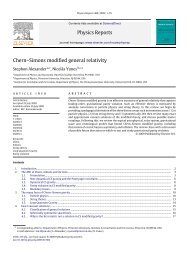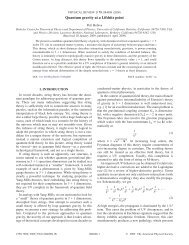- Page 2:
Here Be Dragons
- Page 6:
David Koerner Simon LeVay OXFORD UN
- Page 10:
Contents Acknowledgments vi Introdu
- Page 14:
Here Be Dragons
- Page 18:
Introduction V* At the Institute fo
- Page 22:
INTRODUCTION Sun—towers above the
- Page 26:
INTRODUCTION force and nature remai
- Page 30:
INTRODUCTION So terrestrial biology
- Page 34:
INTRODUCTION No amount of learned d
- Page 38:
1 Origins How Life on Earth Beganl
- Page 42:
ORIGINS longer periods of time: tha
- Page 46:
ORIGINS sistency of events happenin
- Page 50:
ORIGINS Lucretius, whose belief in
- Page 54:
ORIGINS After a week, he analyzed w
- Page 58:
ORIGINS Earth's history, the Sun wa
- Page 62:
ORIGINS supply should be biased tow
- Page 66:
ORIGINS There is a third possibilit
- Page 70:
ORIGINS good humor. And something s
- Page 74:
ORIGINS life that may have taken ho
- Page 78:
ORIGINS 1.3 Chemical structure of D
- Page 82:
ORIGINS leave it for 10 billion yea
- Page 86:
ORIGINS University of Colorado and
- Page 90:
ORIGINS RNA world to the RNA world,
- Page 94:
1 Going to Extremes The Habitats an
- Page 98:
GOING TO EXTREMES the bottom, that'
- Page 102:
GOING TO EXTREMES the cyanobacteria
- Page 106:
GOING TO EXTREMES tirely new hole,
- Page 110:
GOING TO EXTREMES surface, but ther
- Page 114:
GOING TO EXTREMES Japan. 6 To under
- Page 118:
GOING TO EXTREMES to methane lowers
- Page 122:
GOING TO EXTREMES thermophiles. If
- Page 126:
GOING TO EXTREMES 2.1 Carl Woese's
- Page 130:
GOING TO EXTREMES mains gave rise t
- Page 134:
GOING TO EXTREMES species, but a la
- Page 138:
GOING TO EXTREMES toskeleton of euk
- Page 142:
K The Incredible! Shrinking Martian
- Page 146:
THE INCREDIBLE SHRINKING MARTIANS c
- Page 150:
THE INCREDIBLE SHRINKING MARTIANS l
- Page 154:
THE INCREDIBLE SHRINKING MARTIANS w
- Page 158:
THE INCREDIBLE SHRINKING MARTIANS 3
- Page 162:
THE INCREDIBLE SHRINKING MARTIANS t
- Page 166:
THE INCREDIBLE SHRINKING MARTIANS C
- Page 170:
THE INCREDIBLE SHRINKING MARTIANS M
- Page 174:
THE INCREDIBLE SHRINKING MARTIANS 3
- Page 178:
THE INCREDIBLE SHRINKING MARTIANS f
- Page 182:
THE INCREDIBLE SHRINKING MARTIANS C
- Page 186:
THE INCREDIBLE SHRINKING MARTIANS i
- Page 190:
THE INCREDIBLE SHRINKING MARTIANS s
- Page 194:
THE INCREDIBLE SHRINKING MARTIANS p
- Page 198:
E -m The Death and Life of Stars Or
- Page 202:
THE DEATH AND LIFE OF STARS Nichola
- Page 206:
THE DEATH AND LIFE OF STARS Orion i
- Page 210:
THE DEATH AND LIFE OF STARS gravity
- Page 214:
THE DEATH AND LIFE OF STARS flowing
- Page 218:
THE DEATH AND LIFE OF STARS the inf
- Page 222:
THE DEATH AND LIFE OF STARS likely
- Page 226:
THE DEATH AND LIFE OF STARS been ev
- Page 230:
THE DEATH AND LIFE OF STARS duced t
- Page 234:
] The Planet Finders Searching for
- Page 238:
THE PLANET FINDERS Conceptually, th
- Page 242:
THE PLANET FINDERS astronomical his
- Page 246:
THE PLANET FINDERS star at a distan
- Page 250:
THE PLANET FINDERS mass of about th
- Page 254:
THE PLANET FINDERS whether "M stars
- Page 258:
THE PLANET FINDERS was orbiting the
- Page 262:
THE PLANET FINDERS Algol's stellar
- Page 266:
THE PLANET FINDERS fronts) of the l
- Page 270:
THE PLANET FINDERS seconds, which m
- Page 274:
THE PLANET FINDERS tain spectra of
- Page 278:
4 What Happens in Evolution? Chance
- Page 282:
WHAT HAPPENS IN EVOLUTION? sequence
- Page 286:
WHAT HAPPENS IN EVOLUTION? The prop
- Page 290:
Now you don't see it—now you do.
- Page 294:
Coping with heat. One way organisms
- Page 298:
Starbirth. This is a map of far inf
- Page 302:
Imaging extrasolar planets by nulli
- Page 306:
WHAT HAPPENS IN EVOLUTION? erative
- Page 310:
WHAT HAPPENS IN EVOLUTION? cycle is
- Page 314:
WHAT HAPPENS IN EVOLUTION? mains of
- Page 318:
WHAT HAPPENS IN EVOLUTION? ful orga
- Page 322:
WHAT HAPPENS IN EVOLUTION? Gould's
- Page 326:
WHAT HAPPENS IN EVOLUTION? like pro
- Page 330:
WHAT HAPPENS IN EVOLUTION? ning and
- Page 334:
WHAT HAPPENS IN EVOLUTION? tion of
- Page 338:
WHAT HAPPENS IN EVOLUTION? can be e
- Page 342:
WHAT HAPPENS IN EVOLUTION? contain
- Page 346:
WHAT HAPPENS IN EVOLUTION? What doe
- Page 350:
1 SETI The Search for Extraterrestr
- Page 354:
SETI Congress to denounce the fledg
- Page 358:
SETI to let us know that he has fin
- Page 362:
SETI Before it was axed by Congress
- Page 366:
SETI 7.1 Project Phoenix detects an
- Page 370:
SETI of the signal as received by t
- Page 374:
SETI scientists who had recently ob
- Page 378:
SETI during the Soviet era. Two ast
- Page 382:
SETI assesses Drake's estimate that
- Page 386:
SETI believe that there are unexpla
- Page 390:
SETI technological civilizations pe
- Page 394:
SETI would take "miracles" for any
- Page 398:
a Dreamland} The Science and Religi
- Page 402:
DREAMLAND sells books and UFO colle
- Page 406:
DREAMLAND are there for. I can't sa
- Page 410:
DREAMLAND ers, but the medical prof
- Page 414:
DREAMLAND ground. And Jacques Valle
- Page 418:
DREAMLAND rent cultural milieu, mos
- Page 422:
i Exotica Life as We Don't Know It
- Page 426:
EXOTICA one would expect to find th
- Page 430:
EXOTICA while a silicon atom prefer
- Page 434:
EXOTICA mote from what we commonly
- Page 438:
EXOTICA within the Sun. Using this
- Page 442:
EXOTICA partially overcomes the "br
- Page 446:
EXOTICA Tierra, in which the Tierra
- Page 450:
EXOTICA cated machinery which was n
- Page 454:
EXOTICA team, he thinks that highly
- Page 458:
EXOTICA hard to imagine any outcome
- Page 462:
EXOTICA tend to maintain that envir
- Page 466: EXOTICA Feinberg and Shapiro, but d
- Page 470: 10 Many Worlds Cosmology and the An
- Page 474: MANY WORLDS could a carbon atom be
- Page 478: +MANY WORLDS tempts to provide a qu
- Page 482: MANY WORLDS of the scalar fields. W
- Page 486: MANY WORLDS tionally to a singular
- Page 490: MANY WORLDS finding enough matter i
- Page 494: MANY WORLDS Weinberg and his collea
- Page 498: MANY WORLDS ing to make two rather
- Page 502: MANY WORLDS Now we know that the nu
- Page 506: Conclusions Since the dawn of our s
- Page 510: CONCLUSIONS track of them. Less adv
- Page 514: CONCLUSIONS and improbable as woodp
- Page 520: CONCLUSIONS We believe that this ar
- Page 524: CONCLUSIONS rolls. Or maybe we'll c
- Page 528: NOTES TO CHAPTER 1 "Before Enzymes
- Page 532: NOTES CHAPTER 3 13 J.L. Bada, et al
- Page 536: NOTES CHAPTER 5 3 A. Wolszczan, "Co
- Page 540: NOTES CHAPTER 7 14 E. Jones, "Where
- Page 544: NOTES TO CONCLUSIONS (Cambridge: Ha
- Page 548: Big Pine, California, 193 Bios Grou
- Page 552: INDEX 161-162,166-168,175 Greenhous
- Page 556: Networks, Boolean, 136-140 Neumann,
- Page 560: Turing, Alan, 209 UCLA, 2 Ufomind,



![arXiv:1001.0993v1 [hep-ph] 6 Jan 2010](https://img.yumpu.com/51282177/1/190x245/arxiv10010993v1-hep-ph-6-jan-2010.jpg?quality=85)


![arXiv:1008.3907v2 [astro-ph.CO] 1 Nov 2011](https://img.yumpu.com/48909562/1/190x245/arxiv10083907v2-astro-phco-1-nov-2011.jpg?quality=85)








![arXiv:1002.4928v1 [gr-qc] 26 Feb 2010](https://img.yumpu.com/41209516/1/190x245/arxiv10024928v1-gr-qc-26-feb-2010.jpg?quality=85)
![arXiv:1206.2653v1 [astro-ph.CO] 12 Jun 2012](https://img.yumpu.com/39510078/1/190x245/arxiv12062653v1-astro-phco-12-jun-2012.jpg?quality=85)
